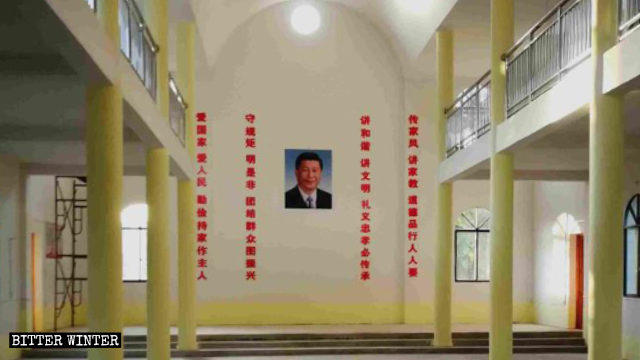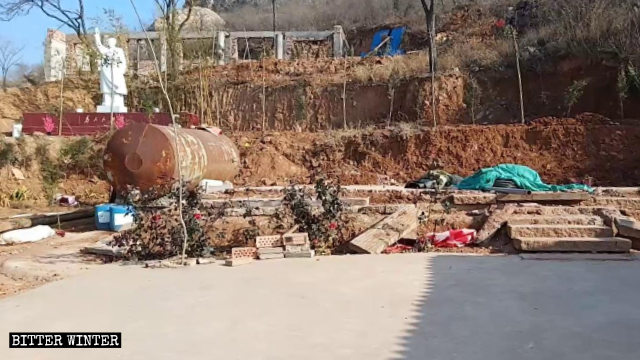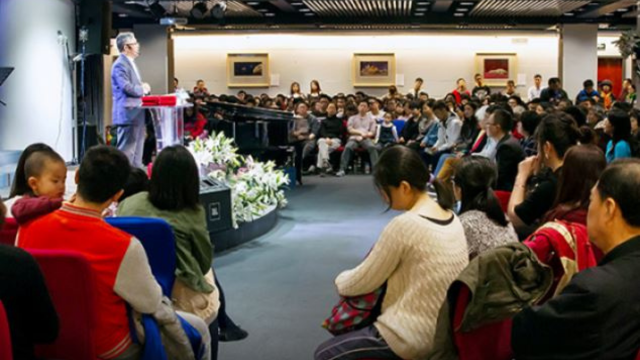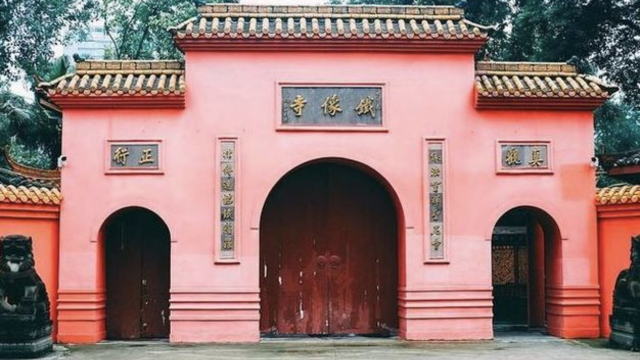What does the totalitarian regime do when news about its mistreatment of citizens get out? It lies, hides or destroys evidence, adopts harsher suppression measures.
by Lin Feng
Eliminating evidence
On November 26, 2019, Bitter Winter reported about the Catholic church in Ji’an city in the southeastern province of Jiangxi, where the painting of the Virgin Mary with the Christ Child was removed on orders from local officials and was replaced with the portrait of President Xi Jinping. After the news circulated widely abroad, local government officials went to the church at night and removed the portrait and propaganda slogans next to it. A wooden signboard, “Minors are forbidden to participate in religious activities,” displayed at the church entrance, was also removed.

A local government employee confirmed to Bitter Winter that the portrait and slogans were removed because the incident had been reported overseas, which has “smeared the CCP’s image.”
After our report about the Zhongyuan Yidianhong Temple in Henan Province’s Ruzhou city, dedicated to the worshiping of China’s leaders, has been widely shared abroad, the government hurriedly destroyed the temple the same month.
Video: A woman is worshiping Xi Jinping and Mao Zedong in Zhongyuan Yidianhong Temple.
According to a local government official, the order to do so emanated from higher authorities, and officials from the provincial United Front Work Department personally came to oversee the demolition.

CCP: “Strict control at home and restrictions aboard.”
Bitter Winter has obtained several documents on the implementation of religion suppression policies, issued in 2018 in the northeastern province of Liaoning. They all expressly emphasize the need for “strict control at home and loose restriction aboard” to properly handle and eliminate timely” the negative information about the CCP, “paying attention to public opinion.”
After countless cases of religious persecution have been exposed by Bitter Winter and other media outlets, the CCP strengthened the confidentiality of documents nationwide, threatening to severely punish anyone who shares such stories or leaks confidential documents.
Instead of changing its policies, the CCP just covers up the truth and continues persecuting its citizens. This has been especially evident in its contradictory arguments about transformation through education camps in Xinjiang.
According to a government insider from the eastern province of Shandong, in September 2019, all CCP members were ordered to study a number of materials prepared by the State Council Information Office that justify the government’s mistreatment of Uyghurs and other Muslim minorities. Texts like the White Paper Vocational Education and Training in Xinjiang, The Fight Against Terrorism and Extremism and Human Rights Protection in Xinjiang, and Historical Matters Concerning Xinjiang, have been created in reply to the outcry from the international community.
“Why would civil servants in Shandong need to study the policies in Xinjiang? Mostly for learning how to manipulate public opinion at home and for creating unified answers to foreigners,” the insider said.
Chinese pastor: “It’s important to expose CCP’s religious persecution.”
A house church pastor who signed the joint statement in 2018 against the persecution of Christianity in China told Bitter Winter that the increasingly harsh suppression measures employed in China make it hard to expose CCP’s viciousness.
“On one hand, the government is blocking the internet and disables many VPN services, which makes it hard to send information aboard promptly,” the pastor said. “On the other hand, the fact that Pastor Wang Yi was sentenced to nine years in prison has raised worries among some church co-workers, who now fear that by contacting overseas media outlets and human rights activists, they will be accused of and punished for ‘subversion of state power,’ ‘cooperation in foreign infiltration,’ or ‘collusion with foreign forces.’”
After the pastor has signed the joint statement, 17 of his church’s venues were shut down, and a church with which they had kept close relations was implicated, its several meeting venues closed as well.
“As far as I know, all the preachers and pastors who had signed the joint statement have become the key targets of persecution: they received warnings or have been summoned, surveilled, tracked, or even arrested and detained,” the pastor continued. Regardless, he still believes that it is essential to expose the truth about religious persecutions in China.
“People should stand up and speak out to defend their religious liberties and should not allow the government to do as it wishes. Those religious groups who have yet been spared harsh persecutions should not keep silent. They might also be disintegrated and shut down by the government one after another,” the pastor said. He added that the pro-democracy movement in Hong Kong should serve as an example. The pastor believes that because they did not compromise with the Chinese regime and spoke out, the Hong Kong people were supported by the international community. Some countries even took concrete steps against the CCP’s totalitarian rule, like the United States, where the Hong Kong Human Rights and Democracy Act was signed into law on November 27, 2019.
source: Bitter Winter












